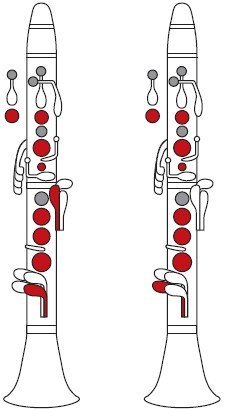Introduction to the F# Dorian Scale
The F# Dorian scale plays a significant role in clarinet music, with a rich history that's worth exploring. This minor scale, with its unique set of notes, gives clarinetists a special toolkit to create varied textures and colors in their music.

Clarinet Fingering Charts are always FREE at MartinFreres.net!
Understanding the F# Dorian Scale
Let's take a closer look at the F# Dorian Scale. It consists of the notes F#, G#, A, B, C#, D#, and E. What makes the Dorian mode stand out is its major sixth, which greatly affects the emotional tone of the music. This feature allows clarinetists to explore various moods, from deep reflection to lively expression, inspiring creativity across different musical styles.
Historical Context of the F# Dorian Scale
The F# Dorian scale has a long and interesting history. While its roots can be traced back to ancient Greece, it wasn't until the rise of jazz and folk music that it really took off. Clarinets were key players in these genres, expressing both cultural identity and technical skill. Today, whether you're playing jazz or classical music, knowing this scale is a must for any dedicated clarinetist.
| Era | Significance of F# Dorian Scale |
|---|---|
| Ancient Greece | Origins of the Dorian mode |
| Jazz Era | Popularization and frequent use in improvisation |
| Modern Times | Essential scale for jazz and classical clarinetists |
Composers and the F# Dorian Scale
Many talented composers have used this scale in their work. For example, some well-known jazz musicians used the F# Dorian scale in their improvisations, creating smooth melodies that grabbed listeners' attention. In classical music, pieces that use this scale show how versatile it can be, giving clarinetists a chance to show off their skills and creativity.
Jazz and the F# Dorian Scale
In jazz, the Dorian mode helps musicians express complex feelings. It's a popular choice for improvisation because it's so flexible. Famous clarinetists like Benny Goodman, a jazz legend, often used these scales to create solos that are still admired today. The clarinet's ability to convey intricate emotions through simple scales is part of what makes it so expressive.
World Music Influence
The F# Dorian scale isn't just for jazz; it's also found in world music. From Brazilian choro to Indian classical music, the Dorian sound is an emotional cornerstone for many traditional styles. When playing world music, knowing how to use the F# Dorian scale can create many chances for performance and teamwork, fostering a worldwide conversation through music.
The F# Dorian Scale as a Teaching Tool
The F# Dorian scale is also an excellent teaching resource. For teachers, introducing this scale early on can help students build a strong understanding of modes. It improves their ability to improvise and encourages them to explore, helping them understand different musical styles and their historical backgrounds.
Tips for Practicing the F# Dorian Scale
As you practice the F# Dorian scale, try different articulations, dynamics, and speeds to find your own style. Use it in your songwriting or improvisation—you might discover a new aspect of your musical personality. Don't be scared to experiment; remember, a clarinetist's unique sound comes from how they play the notes, not just which notes they play.
Learning from the Clarinet Community
Connecting with other clarinetists can provide great support for learning. Sharing your thoughts on the F# Dorian scale with others can lead to interesting discussions and new playing techniques. Working with other musicians also gives you chances to hear different interpretations of this scale, broadening your musical knowledge.
Conclusion
The F# Dorian scale has clearly left its mark on clarinet music throughout history. It has shaped tunes and harmonies across many genres, giving clarinetists a distinctive voice in the music world. As you explore this scale, let your creativity flow and make it part of your musical style, following in the footsteps of the great clarinetists who came before you.
Table of Contents
- Introduction to the F# Dorian Scale
- Understanding the F# Dorian Scale
- Historical Context of the F# Dorian Scale
- Composers and the F# Dorian Scale
- Jazz and the F# Dorian Scale
- World Music Influence
- The F# Dorian Scale as a Teaching Tool
- Tips for Practicing the F# Dorian Scale
- Learning from the Clarinet Community
- Conclusion








